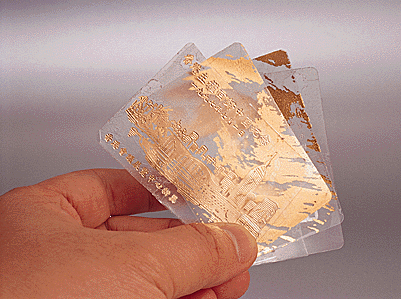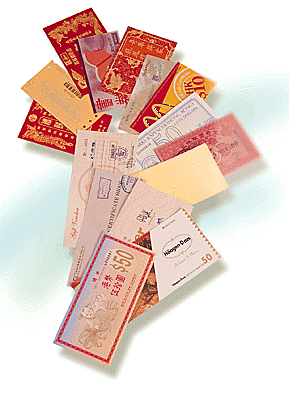Most "Pure Gold Card" Products Contain Only Insignificant Value of Gold; Like Other Gifts and Souvenirs, a Substantial Part of the Price Goes to Design and Craftsmanship
All that glitters is not gold, so goes the saying.
At least one "pure gold card" product has been found to contain no gold - only sheets of golden paper.
This was uncovered in a Consumer Council test conducted on 14 samples of "pure gold card" products - 10 ornaments and 4key rings.
Such products have proliferated rapidly in recent years attracting droves of customers to their pure gold content at very affordable prices. The samples included in the test fetched from $140 to $450 for the ornaments and $20 to$50 for the key rings.
Because of the legislative control on the fineness of gold content in gold ornaments and its strict enforcement, Hong Kong has enjoyed a good reputation and always been a favourite shopping ground for gold ornament buyers.

"Pure gold card" products are sold actually more of a novelty as souvenirs or small gifts and not as gold ornaments.
Consumers buying "pure gold card" products should be aware that like other gifts and souvenirs, such products must bear a substantial part of the costs in design and craftsmanship.
But if pure gold is what you solely value, you may be in for a disappointment. The test revealed only insignificant amount or value of pure gold in these products.
For the 10 ornament samples, the weight of gold was found to range from a mere 0.07 to 0.7 gram. Assuming the price of gold at $85.5 per gram, the value of gold in each ornament is no more than $6 to $60, at best, or about 2%to 31% of the selling price.
All samples were nevertheless certified to confirm with the prescribed standard under the Trade Descriptions (Marking)(Gold and Gold Alloy) Order 1984, i.e. their gold fineness is not less than 990 parts of gold in 1,000parts by weight of alloy.
Of the 4 key ring samples, one was detected to contain no gold at all but only sheets of golden paper.
The sample in question carried a gold fineness marking of 999.9 in contravention of the Trade Descriptions Ordinance. The case has been referred to the Trading Standards Investigation Bureau of the Customs and Excise Department for possible enforcement action.
The gold content in the key rings is equally negligible - it is less than 0.004 gram. Its value, on the same assumption of $85.5per gram of gold, is less than 40 cents per key ring or below 2% of the selling price.
As most "pure gold card" products are not labelled with the weight of gold - only 1 out of 14 samples - it is impossible for consumers to discern by appearance of the product the lowest from the highest gold content.
On the recommendation of the Council, the Hong Kong Jewellers' and Goldsmiths' Association has agreed that both the fineness and the weight of gold should be clearly labelled on all "pure gold card" products as well as in the receipts to customers.
Preliminary Survey Indicates Cake and Video Shops Owe Coupon Holders Millions of Dollars Worth of Goods Yet to be Redeemed

Consumers are holding in their possession cake and video shop coupons estimated to value at a total of $480 million, according to a Consumer Council survey.
The estimate is a projection based on Hong Kong's total households of 1,855,553 on the basis of a random telephone survey of 1,000respondents.
The projection represents only those coupons which consumers have not yet redeemed. It therefore does not reflect the total spending of consumers on prepayment coupons, which will, no doubt, amount to many times over.
Results of the survey indicate that this pattern of consumption - prepayment by consumers - is increasingly common in Hong Kong. The survey shows that 72% of all respondents have used prepayment of one type or another to acquire a diverse range of goods and services.
Besides cake and video shops, others include magazine subscription, beauty salon/health club, gold savings/moon-cake/cured meat wui (club), toll ticket/gasoline coupon and department store gift voucher. Almost all respondents have used Octopus prepayment.
The survey is the first ever conducted to ascertain the prevalence of this mode of consumption in the wake of the recent closure of a major department store and a cake run by coupon holders.
For this survey, it focused solely on cake and video shop coupons. According to the survey, 40% of respondents or their family members have purchased cake coupons while 30% video shop coupons during the past 3 years.
Consumers bought an average of 15 and 30 cake and video shop coupons respectively on each occasion of purchase.
Many were attracted to buy the prepayment coupons to take advantage of the deep discount on offer. The discount generally ranged from 5% to20% for cake coupons and to as much as 40% for video coupons.
The survey shows that nearly 38% of the respondents have already redeemed their cake coupons - leaving each household with 7.9cake coupons, on average, in its possession.
This figure is certain to be higher had it not been for the cake run last November when big crowds rushed to redeem all or most of their coupons.
Taking into account Hong Kong's total households at 1,855,553 and the price of each cake coupon at $37.4 (at a 15% discount on $44), it is estimated that the value of cake coupons held in possession of all households would amount to $310 million.
On video shop coupons, 76.5% of respondents reported to have no coupons in hand - leaving 27.6 coupons, on average, still in the possession of each household.
On the basis of Hong Kong's total households and the concession rate of $15 for each coupon (at 40% on $25), it is computed that the value of video shop coupons still held in possession of all households amounts to $170 million.
In the light of the preliminary survey findings, the Council has decided to further investigate other types of prepayment purchase to assess fully the situation.
The Council is concerned over the virtually total lack of protection to prepayment coupon holders in the event of insolvency or liquidation of a business. As unsecured creditors, consumers stand little, if any, chance of recovering their money.
The Council will study the issue of security of consumer prepayments and put forward recommendations to safeguard the consumer interests.
Consumers, on the other hand, should be made aware of and understand the risk they are taking in prepayment purchases. Further, consumers will do well to safely keep their coupons as most shops offer no compensation to lost coupons. Some coupons also have validity period, consumers should therefore read the terms and conditions carefully.
Mobile Phone Handsets May Look Much Alike But They Differ in Performance as Shown in Council's Comparative Test on 20 Models

Mobile phone is a fast growing market these days. How do you differentiate one handset from another? By its looks or the diverse features it offers?
To assist consumers, the Consumer Council has conducted a comparative test on 20 GSM mobile phone handsets priced from $1,300 to more than $5,000. Results of the test were published in this March issue of 'CHOICE'. Highlights of the findings include:
- The test includes voice performance, sensitivity, convenience, durability, standby and usable time of battery.
- Results show that overall voice performance of most samples are similar.
- But the sensitivity of samples vary significantly. Some are notably easier to make connections in weak signal area.
- There are two types of antenna: fixed and pull-out. Many samples with fixed antenna get low scores in the sensitivity test but it does not imply the pull-out type is consistently better. It just means that pull-out antenna has a higher chance of good sensitivity.
- For samples with pull-out antenna operating in strong signal area, it makes no much difference whether antenna is pulled out or not. However, when operating in weak signal area, the voice performance is improved with the antenna pulled out.
If It Is Too Good To Be True, It Probably Is Holiday makers looking for a sky-and-beach Easter holiday beware: a phone call offering "free" vacation may well be an invitation to an interminable nightmare journey instead.
More consumers have complained of being lured by time-share operators who called up and offered them a "prize" -often a vacation package at a holiday resort abroad - but only to discover later it is anything but free.
Complaints against time-share companies have more than doubled from 39 in 1996 to 84 in 1997 with their victims mostly couples of middle-income group aged between 27 and 65.
According to the complainants, they were invited to a presentation supposedly to collect the prize. But instead they were subjected to a barrage of sales talks to sign up and pay for time-share schemes that will entitle them to 'owning' overseas resorts for a period of time each year.
In one case, a couple was confined in a room for five hours (from 4:00p.m. to 9:00p.m.) under jarring music and high-pressure sales persuasion until they finally gave in. The contract cost them $84,900 - a substantial price for a "free prize".
The couple, who were never thoroughly explained the terms and conditions, later requested to have the contract cancelled. This was quickly turned down.
Here are some advice for the consumers:
- If you happen to receive a call from time-share sales, don't be swayed by the mere offer of a gift. Stay alert. Ask for details such as if the gift package includes air tickets or entails any additional fees.
- Consumers contemplating to join such scheme should find out more about the environment and exact location of the resort, other hidden costs besides the membership fee, and the handling fee for trading resorts with other time-share owners.
- If you come across over-aggressive salespersons, leave immediately. Call the police if you feel you are under pressure to sign any document or make payment.
- If you are still interested, seek legal advice before you sign the contract which may bind you to long-term investment and costs including the resort mortgage and maintenance bills, as well as the legal obligations that ensue.




